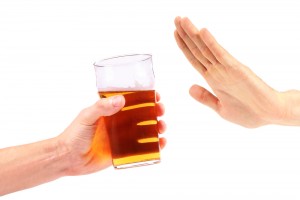
Approximately 15% of adults in Europe drink alcohol to excess, at levels that are likely to affect their health. Most of these people are not alcohol dependent and do not require intensive treatment such as detox and aftercare, but many of them would benefit from a ‘nudge’ to reduce their drinking to safer levels. Screening and Brief Interventions for hazardous drinking are a useful and cost-effective way of doing this. Indeed my cousin the Lifestyle Elf has recently written about screening and brief interventions in primary care and for general hospital patients.
This Randomised Controlled Trial, published in the Journal of the American Board of Family Medicine, describes an evaluation of an intervention that was delivered through 70 GP practices in the Netherlands. The headline result is that the group of patients who received the intervention did show a significant reduction in hazardous drinking when assessed at two-year follow-up. However, this was no cause for celebration because a control group of patients also showed a significant reduction in hazardous drinking at follow-up, and to a greater extent than the group that received the intervention! Therefore, it seems that this particular intervention was, unfortunately, counterproductive.
Methods
The research team invited 2,758 general practices to participate, of which 82 practices (3%) agreed to take part. Five practices dropped out subsequently, and another seven were eliminated because they did not identify any patients who met the criteria for ‘hazardous drinking’ (defined as a score of 8 or above on the Alcohol Use Disorders Identification Test; AUDIT). The final sample comprised 712 patients, who all scored at least 8 on the AUDIT, recruited from a total of 70 GP practices. Each practice was then randomly assigned to either the intervention group (346 patients from 36 practices), or the control group (366 patients from 34 practices). The GP practices in the intervention group received the following:
- Professional-directed interventions such as drinking guidelines, reminder cards, and training sessions about hazardous drinking provided to the GPs themselves
- Organization-directed interventions including feedback from the researchers about their patients’ drinking characteristics, introductions to local addiction treatment services, and provision of training in the alcohol intervention by a trained facilitator
- Patient-delivered interventions including a poster in the waiting room, personalised feedback on their alcohol consumption, and leaflets on alcohol consumption and harmful drinking
The control group were mailed the leaflets about alcohol consumption and harmful drinking (described above), but did not receive any personalised feedback on their drinking or any of the other interventions described above. The primary outcome measure was the proportion of patients in each group who still met the criteria for hazardous drinking, which the researchers obtained by mailing the AUDIT to all of the participants two years after they had originally enrolled in the study.
Results
This is what they found:
- 35.5% of patients from the intervention group had reduced their alcohol consumption to low-risk levels (a score of 7 or below on the AUDIT) after two years
- 47% of patients from the control group had reduced their alcohol consumption to low-risk levels after two years
- This difference between groups was statistically significant (Odds Ratio: 0.62, 95% CI: 0.43-0.90)
- They also found that, across both groups, females, older participants and non-smokers were more likely to shift to low-risk drinking across the follow-up period. Other variables, including beliefs about the effects of alcohol and intentions to reduce drinking, also predicted outcome
Conclusions

The authors concluded that their intervention was counterproductive
The authors concluded that their intervention was counterproductive: although some patients who received the intervention did reduce their drinking to ‘low risk’ levels, the proportion that did so was actually significantly lower than the proportion in the control group, who only received leaflets about alcohol in the post! The research team discussed several possible explanations for their findings. Firstly, the participation rate was low (only 3% of practices that were invited actually took part). Perhaps most importantly, the researchers noted that:
Our program did not result in improvements in rates of screening and giving of advice.
In other words, compliance with the intervention among the GPs was low.
Overall, it is not such a mystery that patients in both the control and intervention conditions showed a reduction in hazardous drinking, because factors such as regression to the mean and ‘non-specific effects’ are common with these types of brief interventions, as the Lifestyle Elf discussed in regards to a different study here. But it is unusual to demonstrate that a control condition produces better results than a brief intervention, and the authors were not really able to explain this in their paper. This particular Elf cannot explain it either.
Link
Hilbink M, Voerman G, van Beurden I, Penninx B, Laurant M. A randomized controlled trial of a tailored primary care program to reverse excessive alcohol consumption. J Am Board Fam Med. 2012 Sep-Oct;25(5):712-22. doi: 10.3122/jabfm.2012.05.120070.


@Mental_Elf Similar to results with 12 steps programmes???
@Mental_Elf Blog on #normalisation of alcohol in the UK. http://t.co/oeUPWeMN
@Mental_Elf @121Therapy (1) project MATCH and the UKATT generally reveal that 12 step no better and no worse than comparison treatment
@field_matt @Mental_Elf @121Therapy (2) The ‘dodo bird’ verdict. Probably lot of non-specific effects. AA have argued not suitable for RCTs
@mental_elf 12 step prog is very rarely adhered to as was intended. My own observations are that recovery is based who not on what.
@mental_elf The who is the patient therapist or sponsor relationship.
@Mental_Elf @121Therapy (3) This is authoritative: http://t.co/dFtuFYCO
@Mental_Elf @field_matt Results dubious unless RCT are done under controlled conditions. AA et al are far from “controlled”.
Thanks Matt,
Yes, the NTASM report from 2006 is helpful, although it is now pretty old: http://www.nta.nhs.uk/uploads/nta_review_of_the_effectiveness_of_treatment_for_alcohol_problems_fullreport_2006_alcohol2.pdf
We should keep an eye out for other good quality research in this area and (as you say) write some more blogs!
RT “@Mental_Elf: Pls RT @DrugScope Tailored primary care Rx 4 heavy drinking may be counterproductive: http://t.co/Hp2DWOW9”>important
@clarercgp @Mental_Elf @DrugScope would be far better if GPs referred to specialists. http://t.co/d2UY57hC
@sanctuarySarah @mental_elf @drugscope disagree! Better to have less heavy drinkers & better services for addicts
@sanctuarySarah @mental_elf @drugscope but will read link later
@clarercgp @Mental_Elf @DrugScope thanks, I found it slightly alarming.
@clarercgp A variation of 10% is nothing really. Some people will need direct reminders, & others won’t. (@Mental_Elf @DrugScope)
@christhegoth @mental_elf @drugscope on whole- Brief intervention better for moderate drinking
@clarercgp Speaking personally I feel me need multiple styles of intervention to cover as many people as possible. (@Mental_Elf @DrugScope)
@Mental_Elf @field_matt thank you for posting the paper. It’s all part of mass rather than tailored nudging
@clarercgp @mental_elf Thanks, glad you found it useful
@Mental_Elf @field_matt only laws will change behaviour
@sanctuarySarah because specialist services don’t exist!
@clarercgp I must be a figment of my own imagination then!
[…] Les omtalen i The Mental Elf her […]